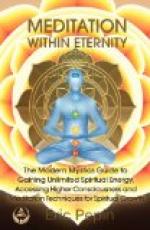“Underneath the shade of the trees,
myself passed into somewhere as a
cloud.
I see my soul floating upon the face of
the deep, nay the faceless face
of the deepless
deep—
Ah, the seas of loneliness.
The silence-waving waters, ever shoreless,
bottomless, colorless, have no
shadow of my passing
soul.
I, without wisdom, without foolishness,
without goodness, without
badness—am
like God, a negative god at least.”
The almost perpetual state of spiritual consciousness in which the young poet lived at this time is apparent in the following lines:
“When I am lost in the deep body
of the mist on a hill,
The universe seems built with me as its
pillar.
Am I the god upon the face of the deep,
nay—
The deepless deepness in the beginning?”
And the following, possible of comprehension only to one who has glimpsed the eternal verity of man’s spiritual reality, and the shadow-like quality of the external; could have been written only by one freed from the bonds of illusion:
“The mystic silence of the moon,
Gradually revived in me immortality;
The sorrow that gently stirred
Was melancholy-sweet; sorrow is higher
Far than joy, the sweetest sorrow is supreme
Amid all the passions. I had
No sorrow of mortal heart: my sorrow
Was one given before the human sorrows
Were given me. Mortal speech died
From me: my speech was one spoken
before
God bestowed on me human speech.
There is nothing like the moon-night
When I, parted from the voice of the city,
Drink deep of Infinity with peace
From another, a stranger sphere.
There is nothing
Like the moon-night when the rich, noble
stars
And maiden roses interchange their long
looks of love.
When I raise my face from the land of
loss
Unto the golden air, and calmly learn
How perfect it is to grow still as a star.
There is nothing like the moon-night
When I walk upon the freshest dews,
And amid the warmest breezes,
With all the thought of God
And all the bliss of man, as Adam
Not yet driven from Eden, and to whom
Eve was not yet born. What a bird
Dreams in the moonlight is my dream:
What a rose sings is my song.”
The true poet does not need individual experiences of either sorrow or of joy. His spirit is so attuned to the song of the universe; so sympathetic with the moans of earthly trials, that every vibration from the heart of the universe reaches him; stabs him with its sorrow, or irradiates his being with joy.
Jesus is fitly portrayed to us as “The Man of Sorrows”; even while we recognize him as a self-conscious son of God—an immortal being fully aware of his escape from enchantment, and his heirship to Paradise.




